|
|
| |
|
 Musings from the Edge of Forever
Musings from the Edge of Forever
Note: This blog expresses only the opinions of the blog owner,
and does not represent the opinion of any organization or blog
that is associated with RONIN ON EMPTY.
|
|
April 18th, 2010
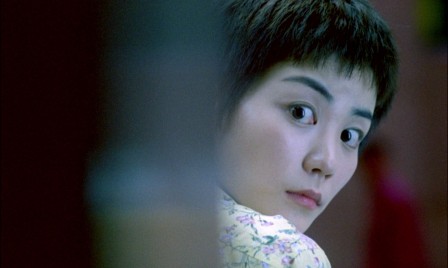
Lesson learned from watching Chungking Express and Amelie: stalking is totally okay…if you’re a doe-eyed cutie
I’d wager vital parts of my anatomy that Chungking Express is probably the first Wong Kar-Wai film that most Americans saw. It took the top slot in the Reader’s Poll, and although I didn’t vote it #1, I probably would’ve if you’d asked me ten or eleven years ago. When I first saw this flick via Quentin Tarantino’s now defunct Rolling Thunder label (The fact that they never released Rolling Thunder itself boggles the mind), and I honestly didn’t know what to think of the movie once I’d finished it. Confused, challenged, yet strangely exhilarated, Chungking Express was like no Hong Kong movie I’d seen before — and that’s actually saying something if you think about how weird, wild, and downright nutty Hong Kong cinema can get. Interestingly enough, it was an experience that I would have repeatedly when watching other Wong Kar-Wai films.
Read the rest of this entry »
Posted in Days of Being Wild, Ashes of Time, Happy Together, Chungking Express, Faye Wong, Hong Kong cinema, Top Hong Kong Films of the 1990s, Wong Kar-Wai | 2 Comments »
April 18th, 2010
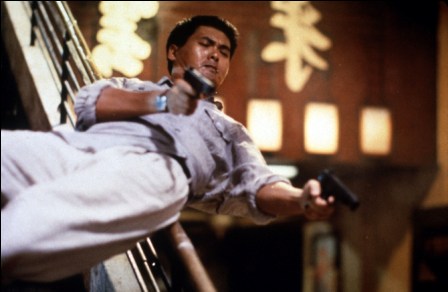
C’mon, who HASN’T wished they could do this?
I first saw John Woo’s Hard Boiled on Cinemax.The cable company gave us a free trial, and I timed my VCR to record this film, along with A Better Tomorrow, Vampire Hunter D, and The Wicked City. Although I can’t speak for those who lived in major metropolitan centers, in my day, both Hong Kong films and anime were damn hard to come by, especially if you lived in rural Oklahoma. Don’t worry, I’ll avoid the obligatory “You kids today don’t know how easy you’ve got it!” spiel and continue with my stroll down memory lane.
In my childhood, the only Chinese movies that I ever got to see on TV or on VHS were Bruce Lee films, Brucesploitation flicks, and badly dubbed chopsockies that were probably produced by studios other than Shaw Brothers or Golden Harvest. As a result, Bruce Lee was probably the only identifiably positive image of an Asian man in American popular culture, and, of course, his appeal was very much tied up in his proficiency in the martial arts. Not that there’s anything wrong with that. My point is — for those of us very much stuck in an American pop culture perspective, for an Asian guy to be cool, he had to know kung fu.
All that changed with Hard Boiled and Chow Yun-Fat. As silly as it may sound to those of you who are either a bit younger than me or who were always culturally plugged into Asian cinema, Chow Yun-Fat was the first Asian actor I’d ever seen who was undeniably cool. Of course, Cinemax showed the dubbed version, so Chow sounded like a pissed off Aussie, but it didn’t matter to me — Chow’s Tequila Yuen was a cool customer very much in line with the heroes I admired in Hollywood films — Dirty Harry, Snake Plissken, John McClane, etc. Role models aren’t that important to me anymore, but as a youngster, Chow Yun-Fat’s Tequila Yuen meant the absolute world to me.
Read the rest of this entry »
Posted in Top Hong Kong Films of the 1990s, Hard Boiled, Chow Yun-Fat, Hong Kong cinema, Bruce Lee, John Woo | 1 Comment »
April 18th, 2010
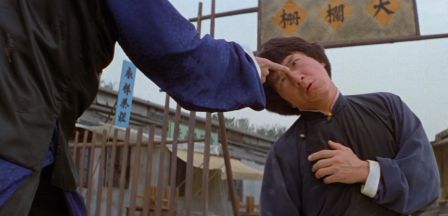
Drinking is cool! It makes you invincible!
Drunken Master II is another choice of mine that is just as equally deserving of the top spot. In fact, I think it’s probably one of the best martial arts films ever made. This just goes to show what an inexact science these kinds off lists are.
Here’s what I said about the movie awhile back:
Drunken Master II is perhaps Jackie Chan’s finest film, if not the best kung fu movie ever put on celluloid. It has some of Jackie’s best stunts, mixing original director Lau Kar-Leung’s old school choreography with Jackie Chan’s contemporary kung fu comedy shtick. A word of warning: don’t analyze the plot too closely (Oh Andy Lau, where art thou?), and you’ll be just fine. Just sit back and enjoy the fireworks. Chan’s last stand against the amazing leg-fighter Ken Lo is probably one of the best ending battles in cinema history. Really.
What some of you may not know is that this movie actually had a troubled production. Shaw Brothers legend Lau Kar-Leung was the film’s original director, but when Jackie Chan screened the film for the Hong Kong Stuntman’s Union, he realized that Drunken Master II had some problems — namely, it was a little too old-fashioned for modern sensibilities. According to Chan, he offered Lau Kar-Leung the chance to make changes, and when he wouldn’t comply, Chan himself had to step into the director’s chair and rework the ending fight. Although I’ve not heard Lau’s side of the story, Chan claims that he would have kept all this under his hat, but it was Lau who complained publicly, announcing that he’d do a REAL drunken kung fu movie. However, the resultant film — the misleadingly titled Drunken Master III – was a complete disaster and a real embarrassment for Lau Kar-Leung.
Read the rest of this entry »
Posted in Lau Kar-Leung, Police Story 3: Supercop, Drunken Master 2, Top Hong Kong Films of the 1990s, Jackie Chan, Hong Kong cinema | 1 Comment »
April 18th, 2010
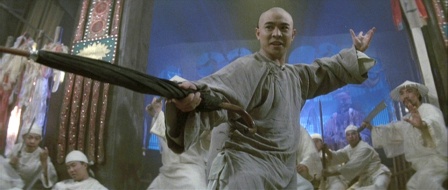
Best Jet Li movie ever. I will fight you if you say different.
If I voted today, perhaps Once Upon a Time in China 2 would be my number one choice. As I’ve written before, Once Upon a Time in China 2 was the gateway film — it opened the door to Hong Kong cinema for me, and I jumped right on through and never looked back. I saw this sequel in Singapore back in 1992*, and was instantly smitten. My relatives kept back issues of an entertainment magazine called Eight Days, and I rummaged through them, clipping out reviews for any similar movie I could find. I would then take these clippings to the Chinese video rental place for reference, coming back with VHS copies of Fong Sai-Yuk 1 and 2, Swordsman II, etc. When I came back to the States, I bought VHS tapes through mail order (those damned 2 tape sets!), and then, because I was afraid I’d wear out the tape, I’d record those two-tape sets to a single VHS tape using a second VCR. I even printed cool stickers to make the tapes look professional. I bought books! I bought soundtracks! I was obsessed.** When Once Upon a Time in China finally showed up on region 1 DVD, I was in complete disbelief. “Cult films” had gone mainstream.
Read the rest of this entry »
Posted in The Tai Chi Master, Fist of Legend, Swordsman 2, Fong Sai-Yuk, Top Hong Kong Films of the 1990s, Once Upon a Time in China 2, Jet Li | 2 Comments »
April 18th, 2010
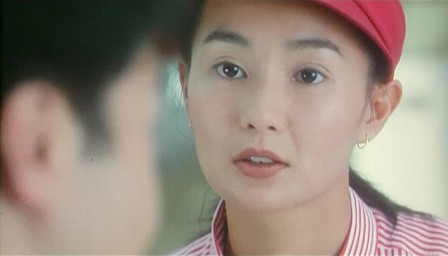
Maggie Cheung — McDonald’s Employee of the Decade
Comrades, Almost a Love Story is my favorite Hong Kong romance of all-time.* I love this movie more than Needing You, Chungking Express, and In the Mood for Love, and I’m extremely fond of all three. This Peter Chan-directed film garnered numerous prizes at the 16th Annual Hong Kong Film Awards, and with good reason, it’s a wonderful film. Comrades tells the story of Xiao-Jun, a dopey, goodhearted Mainland Chinese immigrant played by Leon Lai, who arrives in Hong Kong looking to make a few bucks to send back home as well as save up for his eventual wedding to his hometown sweetheart (Kristy Yeung). As fate would have it, our hero befriends a tough, street savvy “local” girl named Chiao (Maggie Cheung). The two make an unlikely pair; they certainly don’t seem all that compatible on the surface, but as you might expect, sparks start to fly. What happens next is a decade long “romance” that takes us from the streets of Hong Kong all the way to New York City.
Who doesn’t love that bicycle scene? Or the way that Teresa Teng’s music is deftly interwoven into the fabric of the story as a kind of thematic parallel? This is, by far, my favorite Maggie Cheung performance of all-time, and this movie definitely made me see Leon Lai in a completely different light. The most surprising performance in the film is Eric Tsang’s; he is flat-out is great in this movie. Tsang’s role as Maggie Cheung’s possible love interest may seem absurd on paper (see Wo Hu for a similar Eric Tsang romance that stretches the limits of believability), but he really makes it work. Initially, you think his character is going to be just another menacing gangster cliche, but Tsang (and the scriptwriters, one assumes) give the character a wise, “seen-it-all” maturity that makes him incredibly endearing, even if you’re rooting for a Chiao/Xiao-Jun romance to take flight. His “exit” from the from the movie isn’t just a case of removing a second suitor from the proceedings — you actually care what happens to him and mourn his loss. Speaking of heartbreaking, how about Kristy Yeung’s character, Xiao Ting? A more stereotypical romance would have given her a fatal flaw to make her character much more easily dispensable — except she isn’t; she’s the sweetest character in the whole movie. And that’s one of the things I really like about this film — there are no bad guys. Nobody is a lout. Love happens when you least expect it, but not without a few hearts getting broken in the process.
Read the rest of this entry »
Posted in Kristy Yeung, Eric Tsang, Peter Chan, Maggie Cheung, Top Hong Kong Films of the 1990s, Leon Lai | 1 Comment »
April 18th, 2010
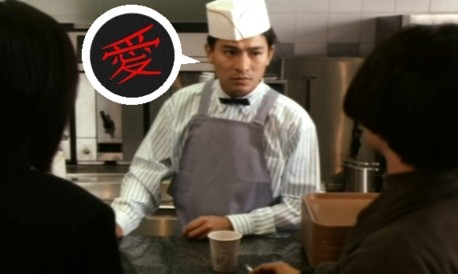
With the official LoveHKFilm.com reader poll on the Top Hong Kong Films of the 1990s now complete, I thought I might as well share my own top choices with everyone. The moment this poll was announced, I scribbled down what amounted to about twenty-five or so 90s era Hong Kong films that I absolutely loved or really, really liked. After consulting our archive and recommendation lists to make sure a really wonderful movie hadn’t completely slipped my mind, I whittled the list down to twenty choices and sent them in to Kozo. Of course, there are so many films to choose from, so even personal faves like Lost and Found and Rave Fever got cut out in the process. Before I begin, let me be clear about one thing, I had ZERO desire to create a list that would be considered as “representative” of the decade. That’s a tactic we often see in random magazine and website top ten lists (I’m looking at you, Entertainment Weekly), as a few “respectable choices” are mindlessly tacked on to add some air of legitimacy. Well, NONE of my choices were made because I thought I should fulfill somebody else’s expectations of what a top ten (or twenty in my case) list should look like. I went with my head, my heart, and my gut.
The last time I composed a top ten list, I chose to do a countdown. I did so for at least three reasons: 1) I was modeling it after current AICN and former CHUD.com critic, Jeremy “Mr. Beaks” Smith’s ambitious Top 100 Films of the Decade countdown, 2) a LoveHKFilm.com’s reader’s poll countdown was already under way, and I thought that readers might be interested to know if my picks coincided with their own, in anticipation of the final ten, and 3) it seemed like writing and posting about my choices in piecemeal fashion made a lot more sense than crafting an overlong and unwieldy blog post that nobody would want to read. Sounds logical enough, right?
Well, this time around, I’m going to do things a little differently. Not only is the 90s readers’ poll long over, but I just really don’t have a desire to write about every movie that I chose with the same level of depth. Instead of a countdown, I’m gonna just lay it all out here and then talk about some of the films in separate blog posts.
Read the rest of this entry »
Posted in Comrades Almost A Love Story, Maggie Cheung, Drunken Master 2, Hard Boiled, Chungking Express, Faye Wong, Top Hong Kong Films of the 1990s, Once Upon a Time in China, Hong Kong cinema, Leon Lai, Jet Li, Jackie Chan, Wong Kar-Wai | 5 Comments »
April 10th, 2010
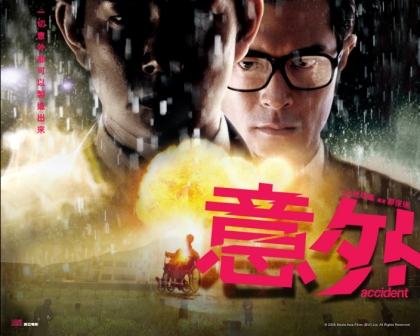
What if there are no accidents in life? No, I’m not trying to sell you some baloney about “interconnectedness,” “destiny,” or “fate,” but instead using that oft-heard question as a means to articulate the central premise of Soi Cheang’s 2009 thriller, Accident.* If this film is to be believed, there are hitmen out there who rely on some very elaborate, unconventional methods to get the job done. Rather than plugging their intended victims from a great distance using a sniper rifle or tossing them in the nearest body of water, these assassins — led by Louis Koo’s Ho Kwok-Fai, aka “The Brain” — kill people in the most intricate, labyrinthine way imaginable . Their method involves setting up a domino effect in which the victim gets killed in a manner that makes ordinary citizens and the authorities alike think it was just horribly tragic accident, rather than a case of premeditated murder. Clearly, Ho Kwok-Fai and his team are the best there is at what they do. And what they do isn’t very nice.
As professional as they are, even assassins are prone to accidents. Case in point: during the latest routine job, one of Kwok-Fai’s men (Stanley Fung) leaves behind a key piece of evidence that could tie the entire team to the man’s death. What results from this simple accident is a series of events that plunge Kwok-Fai headfirst into a sea of paranoia, as he discovers that he may not be able to trust any of his teammates anymore. Even worse, there may be another “Fixer” on Kwok-Fai’s trail who’s looking to plan a little accident of his own — this time involving Kwok-Fai himself. That enigmatic man in the shadows is played by Richie Ren, who comes across as a slick-dressed urban professional, albeit one who always seems to be nearby. Is his constant presence a coincidence — a so-called “happy accident,” as the saying goes? Or is this guy a cold-blooded assassin, too?
Occasionally, reminiscent of both Francis Ford Coppola’s The Conversation and Alfred Hitchcock’s Rear Window, Soi Cheang’s Accident isn’t quite in the same league, although it is an undeniably well-made, largely absorbing thriller in its own right. For me, the events that make up the majority of the film play out in such a cool, unassuming manner that it made the incredibly over-the-top, completely unconvincing “accidents” a little hard to swallow. If even one little thing goes wrong in the great chain of certain death, then the entire operation must be aborted. While I suppose the same could be true for any “hit,” the sheer amount of time, preparation, and labor that goes into planning and executing these murders seem a tad more involved than a simple bullet to the head would be.
To some degree, I could suspend my disbelief on that matter; however, the real problem I had with the film is the fact that Accident doesn’t quite nail the ending. What happens is telegraphed so early on that I was surprised that the filmmakers actually decided to go on with it. Perhaps if the film had made Koo’s character more convincing and relatable, then the finale would have resonated as a real “Oh no!” moment. Instead, my reaction was more like, “Really? You’re really going to end it like that?”
For those of you who’ve seen Shutter Island (and I won’t spoil it, for those of you who haven’t), you know that the film ends on a somewhat controversial twist. Although I personally didn’t care for it, what was admittedly good about that choice was that it was tonally consistent, explained curious behaviors and acting choices throughout the film, and made it instantly rewatchable (for the willing, anyway). While Accident’s ending is tonally consistent, it’s not nearly as interesting. I know the old adage, “It’s the journey, not the destination,” but for me, the place Accident finally takes you spoils the whole damn trip.
* I keep wanting to call this movie The Accident. Really, it should be called Accidents or even better, Sorry, My Bad! — especially in light of the ending.
Posted in Richie Ren, Louis Koo, Soi Cheang, Accident | No Comments »
|
|
|
| |
| |
|
|
|
|
|
|
|
|
|
|
|
|
|
|
|
|
|
|
|
|
|
|
|
|
|
|
|
|
|
|
|
|
|
|
|
|
|
|
|
|
|
|
|
|
|
|
|
|
|
|
|
| LoveHKFilm.com
Copyright © 2002-2026 Ross Chen |
|
|








